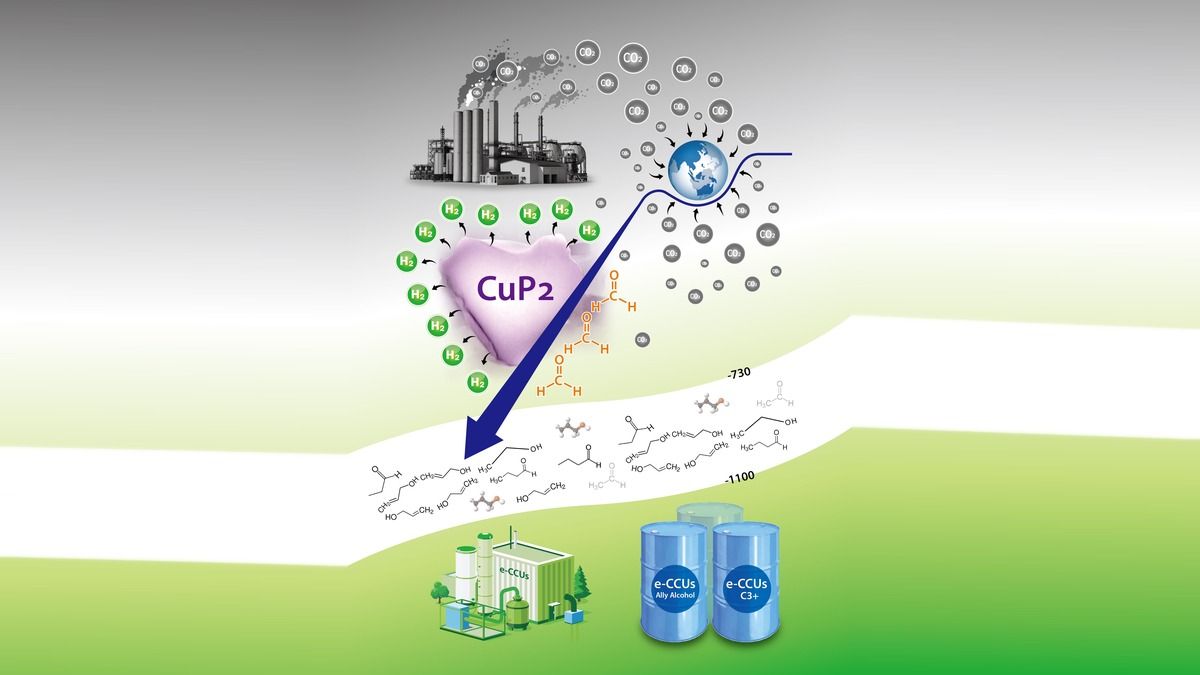The article copper catalyst: Researchers are changing CO2 in alcohol Um first appeared at the online magazine Basic Thinking. You can start the day well every morning via our newsletter update.

With a new procedure, researchers in South Korea converting CO2 efficiently into alcohol. This creates a new perspective for climate neutrality and at the same time open up economic possibilities.
In order to counter climate change, politics and science always develop new ways of avoiding or reducing CO2. At the same time, they are working to compensate for the emissions already caused.
A research group at the South Korean Gwangju Institute of Science and Technology (GIST) has now developed a new way to recycle carbon dioxide. They published their results in the scientific journal Nature Catalysis.
Researchers in South Korea convert CO2 into alcohol
The team created a phosphorus-rich copper catalyst by integrating copper phosphide into a membrane-electrode unit and also used a nickel iron oxidation catalyst.
The combination makes it possible to convert CO2 in allyl alcohol. It is a substance that is suitable for the production of plastics, adhesives, disinfectants and fragrances.
The method is not necessarily new. In the past, the conversion of CO2 into alcohol -based products had turned out to be promising. It has a high energy content and economic traction. However, it has so far failed due to scalability and low efficiency.
Copper catalyst enables high energy yield
With their new facility, however, the researchers in South Korea achieved an energy yield of 66.9 percent. This is about four times the previous best performances, which were around 15 percent. In addition, the new approach does not require unwanted by -products.
“The production of these high -quality connections when liquid is difficult,” explains Professor Dr. Jaeyoung Lee in one Press release. The formation of carbon-carbon bonds and the low stability of the intermediate reaction products is particularly challenging.
For this purpose, the scientists have identified a new reaction path: the coal atoms are connected by using the intermediate formaldehyde as a “bridge” to create larger molecules. This mechanism increases the commercial value of the product because it generates fluids that are easier to store and be transported.
Alcohol from CO2: new perspectives for economy and climate protection
“This technology is considered a breakthrough in the climate neuterality era and is expected to open up completely new economic perspectives for electrochemical binding and use of CO₂,” says the press release.
“This CO₂ conversion could open up new business areas for the coal, petrochemical and steel industry, which have come under great pressure due to increasing emission requirements,” emphasizes Lee. “We see this as an important milestone towards climate neutrality – thanks to scalable science and technology.”
Co-author of the study, Dr. Minjun Choi, emphasizes that the concept is also suitable for integration in flow and zero-gap membrane electrode systems. “This could enable sustainable and large-scale production of liquid fuels and chemical preliminary products from CO₂-and thus pave the way into a fossil-free future.”
Also interesting:
- AI in science: fake research for advanced users
- Research: AI develops more creative ideas than 50 scientists together
- Prompts: Complex AI requests cause up to 50 times more CO2
- “Breathe” battery stores electricity and binds CO2
The article copper catalyst: Researchers are changing CO2 in alcohol Um first appeared on Basic Thinking. Follow us too Google News and Flipboard Or subscribe to our update newsletter.
As a Tech Industry expert, I am impressed by the innovation and potential of using copper catalysts to convert CO2 into alcohol. This breakthrough has the potential to address two major environmental challenges – reducing greenhouse gas emissions and producing sustainable fuel alternatives.
Copper catalysts have been known for their ability to facilitate chemical reactions, and harnessing their power to convert CO2 into alcohol is a promising development in the field of catalysis. This process not only helps in reducing the levels of CO2 in the atmosphere but also produces a valuable product like alcohol which can be used as a fuel source.
The use of copper catalysts in this process also highlights the importance of sustainable and eco-friendly technologies in the tech industry. By continuously exploring and improving upon such innovative solutions, we can work towards a cleaner and greener future.
Overall, the conversion of CO2 into alcohol using copper catalysts is a significant advancement in the fight against climate change and showcases the potential of technology to create positive environmental impact.
Credits